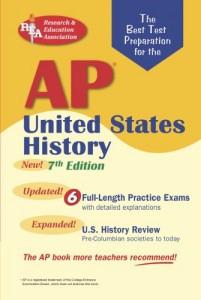 Leesville, save AP US History!
Leesville, save AP US History!
I never, ever, thought I would write those words. Or even think them. AP US History was the bane of my existence during my junior year. I struggled through every single class period, every note-taking session and every test or pop quiz. The class is notoriously hard – I had been warned countless times to sign up for Honors US History like a normal person, so I put the stress entirely upon myself.
Beginning with the ridiculous amount of summer work — reading A Short History of the United States, which was anything but short, taking eight online quizzes and reading and taking notes on the first two chapters of the textbook — I was already nervous about the first day of APUSH.
I sat dumbly through the class each day as information was flung at us, from the ancient civilizations that first inhabited America to modern times. I cursed my teacher, Andy Hunt, under my breath each day and began to feel proud of myself when I got my tests back with a passing grade.
To sum it up, APUSH was awful.
I managed to end the class with a C — the only one I received in my life, and I set out to study for the AP Exam in the spring. I took practice tests in my review book, attended Mr. Hunt’s study sessions during Pride Period; I was shocked when I received my scores and realized I had somehow managed to pull off a four, giving me college credit for the class.
In retrospect, I never would have been able to get a four on the exam if Mr. Hunt had not made the class so difficult. Basically, APUSH had to be bad to do good.
According to the AP US History Course Description, “The program prepares students for intermediate and advanced college courses by making demands upon them equivalent to those made by full-year introductory college courses. Students should learn to assess historical materials—their relevance to a given interpretive problem, reliability, and importance—and to weigh the evidence and interpretations presented in historical scholarship.”
The course description also states, “An AP U.S. History course should thus develop the skills necessary to arrive at conclusions on the basis of an informed judgment and to present reasons and evidence clearly and persuasively in essay format.”
The class at Leesville follows this AP curriculum which, although making APUSH extremely difficult with a heavy workload, did a great job of preparing students for the AP exam. Because reading historical documents and writing about them was a big part of the exam, the long readings we had for homework each night actually paid off.
Sure, Hunt could have turned the class into an “easy A” — giving busywork assignments as grade boosters, going less in-depth on his tests and basically making it a farce. But he would not be anywhere close to the 99% passing rate on the AP exam that he has right now.
The fact that one semester of hell meant I never had to take the class again made all the misery worthwhile and allowed me to realize that maybe there were some upsides to APUSH.
For one, the four on the AP exam gave me three hours of college credit, and I know I could never have done it through just “Independent Study.” Mr. Hunt’s tests and essays were much harder than the exam, which, although sending me into a spiral of despair, sufficiently prepared me.
I also can not deny that I learned a lot. I can still recite random information, including dates, about American history, and much of this knowledge has made me the reigning Jeopardy! champ in my house. The class also taught me how to handle other AP classes, especially when it comes to writing essays and gaining an understanding of the material — not just attempting to memorize an entire textbook.
The students also formed bonds with one another, united by our big mistake in signing up for classes sophomore year. The APUSH kids from both classes still enjoy complaining about specific questions from tests (we’re nerds), how perverted the author of our textbook (fondly known as Garraty) was and how we spent our entire Christmas breaks working on the fabled “Presidential Flippers.” There are inside jokes from each class, and some people even manage to find some fond memories buried in the stress.
It actually makes me sad to hear that the APUSH class this year will not have as big of a support group — there is only one class of about eighteen students, as opposed to the two classes of about thirty each last year. The number of students who have heard the horror stories and opted for Honors US History is rising, which is placing APUSH at Leesville on life-support.
Luckily, according to Hunt, over sixty kids came to an APUSH interest meeting “off of first semester recommendations alone.” I hope these brave young souls will take the plunge and forge through APUSH, especially now that administrators are looking to make it a year-long course, hopefully cutting each day’s workload in half.
According to College Board’s Seventh Annual AP Report, “Research consistently shows that students who score a 3 or higher on AP Exams typically experience greater academic success in college and are more likely to graduate on time than otherwise comparable non-AP peers.”
Although I hope that APUSH students will not have as much trouble as I did in the course, I encourage hard workers to take it, especially if they plan to take the AP exam (a four or higher gives students three hours of credit at UNC-Chapel Hill). However, a love of American history, a hope for tools that will aid you in other AP classes or a hatred of doing anything but homework over winter break is also reason enough.

Leave a Reply